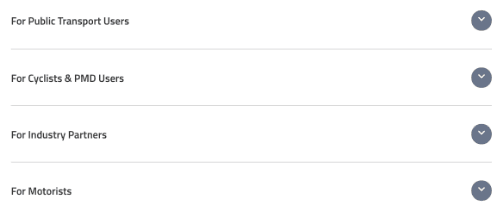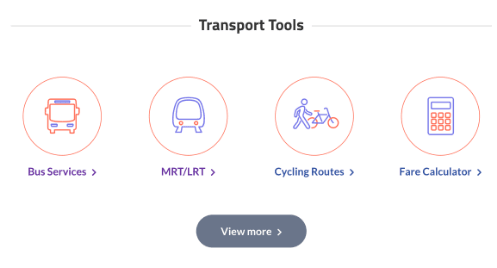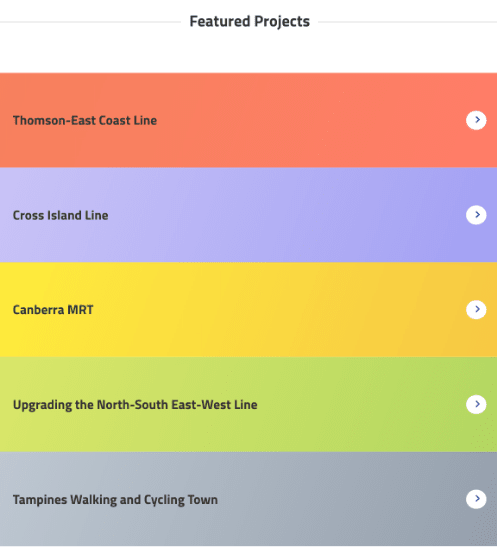The Land Transport Authority (LTA) has completed the evaluation of point-to-point transport (P2P) operators’ licence renewals and applications. All existing licensees will have their respective licences renewed, and two new ride-hail operators will be awarded one-year provisional licences. The licensing conditions have been updated to incorporate new regulatory requirements announced as part of the first phase of the P2P industry structure and regulatory framework review. The licences will take effect from 1 January 2025.
Licences issued under the revised P2P Regulatory Framework
2. LTA has awarded the Street-hail Service Operator Licence (SSOL), Ride-hail Service Operator Licence (RSOL) and Car-pool Service Operator Licence (CSOL) to the following existing and new operators:
Licence Type |
Awarded P2P Operators |
SSOL – 10-year validity |
|
RSOL – 3-year validity |
|
CSOL – 3-year validity |
|
LTA has also awarded a one-year provisional RSOL each to Geo Lah Pte Ltd and Trans-cab Services Pte Ltd, which will enable these operators to fine-tune their operational capabilities to meet LTA’s regulatory standards for safety and service provision, before they are considered for a full RSOL. |
|
3. All awarded P2P licences will commence from 1 January 2025. Licensees must comply with the conditions of their licences, including meeting LTA’s safety standards and ensuring that partnership arrangements with drivers are non-exclusive in nature. For more information on the P2P regulatory framework and the list of licensed operators, please visit LTA’s website.[1]
Updates to Licensing Conditions
4. For all new licence applications and renewals, licensing conditions have been updated to incorporate the following key changes:
a. Removal of call-booking requirement: With the exception of CDG Zig Pte Ltd, which operates the call-booking service for Comfort Transportation Pte Ltd and CityCab Pte Ltd, call-booking services will no longer be a licensing requirement for smaller street-hail operators. Smaller street-hail operators that choose to continue offering call-booking services will not be subjected to LTA’s Quality of Service standards and data submission requirements for such services.
b. Operational contingency and exit notifications: Operators will be required to put in place plans to respond to any breach in information security in a timely manner and to ensure there are contingency plans to manage incidents which will impair or disrupt ride-hail service operations, to mitigate the impact of such disruptions on drivers and commuters. Operators that intend to exit the market must also provide LTA with an exit plan which should include details on the transition arrangements for affected drivers and the settlement of outstanding financial payments to drivers and commuters. The exit plan must be submitted with a minimum notice period of 120 calendar days, double the current notice period of 60 calendar days.
c. Features to improve matching for different service types: Ride-hail operators must ensure that commuters have the option to indicate if they require a vehicle that is able to accommodate a folded wheelchair, or one that is equipped with a child seat. Operators must also notify commuters if a matched vehicle cannot accommodate these needs, to allow commuters to cancel and rebook within the grace period if they had forgotten to indicate their requirements. Drivers will be able to cancel a booking without incurring a penalty if commuters failed to indicate the need for wheelchair space or a child seat at the point of booking.
d. Trip information transparency: Operators will be required to display a standardised set of trip information to drivers to improve the transparency of trip requests, allow drivers to more easily compare trips offered across various platforms, and facilitate multi-homing (i.e. for drivers to use different platforms).
5. Together with earlier announced changes aimed at updating the regulatory regime for taxis and PHCs,[2] these new measures are aimed at (i) stabilising the taxi supply, (ii) enhancing the resilience of P2P services to mitigate the impact of any service disruption on commuters and drivers, and (iii) ensuring that P2P services are able to cater to a wider range of needs. The updated licensing conditions will take effect from 1 January 2025 in conjunction with the awarded licences.
Streamlining of Taxi Driver’s Vocational Licence Training
6. To further encourage drivers to consider taxi driving, as announced earlier this year, LTA will streamline the training curriculum and lower the course fees for the Taxi Driver’s Vocational Licence (TDVL). The revisions will take effect from 24 February 2025. Key changes to the TDVL training are:
a. Streamlined training hours: The TDVL curriculum has been reviewed and updated to be more relevant to the demands of driving a taxi today. With a streamlined curriculum, the total training hours required to obtain a TDVL will be reduced from 16 hours to 12 hours. The number of training hours required to convert a Private Hire Car Driver’s Vocational Licence (PDVL) to a TDVL will also be reduced, from 8 hours to 5 hours.
b. Reduced cost of training and testing: The cost to obtain a TDVL will be reduced from $275 to $250 (before GST), and the cost to convert a PDVL to TDVL will be reduced from $145 to $132.50 (before GST).
Update on Phase 2 Review
7. LTA is working on Phase 2 of the review of the P2P industry structure. We will continue to engage industry stakeholders on other ways to improve the overall stability of P2P supply to meet evolving commuter needs and to strengthen the contestability of the P2P market so that drivers’ and commuters’ interests are protected. LTA aims to provide an update on Phase 2 of the review in March 2025.
















